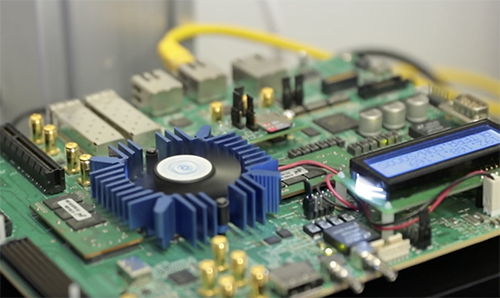Signal processing research conducted at Southampton has led to new algorithms and hardware to support fifth generation (5G) wireless communications, contributing to faster data speeds and greater energy efficiency. Through successful spin-out company AccelerComm Ltd, technology based on the research is being used in devices and the wireless network infrastructure around the world. In addition, Southampton’s expertise in this field has informed global industry standards and UK government policy on 5G.
Research challenge and context
State-of-the-art mobile communication depends on complex signal processing – digital techniques to generate and analyse wireless signals – to transmit large amounts of communications data in an energy-efficient way. In mobile devices and base-stations (the masts and equipment that support the mobile network), signal processing must be sped up using specialist processors, a technique known as hardware acceleration. This enables the signal processing to keep pace with the amount of data coming through.
Conventionally, this hardware acceleration is designed separately from the signal processing algorithms. However, achieving the required processing throughput can result in poor signal processing energy efficiency.

Our solution
Professor Rob Maunder's research team at Southampton developed methodologies for the joint design of signal processing algorithms and their hardware acceleration. Using this approach, the throughput and the energy efficiency of both the transmission and the processing can be jointly optimised. This represents key enabling technology, which allows the promise of 5G to be delivered in a cost-effective way.
What was the impact?
A University spin-out company, AccelerComm Ltd, was established to design specialist hardware accelerators based on this research, with a focus on enabling 5G technologies. To date the company offers 16 accelerator design products, which are enabling its customers to innovate and make their communications systems faster and more energy efficient. Following partnerships and licensing agreements with several organisations including Intel, Xilinx and National Instruments, hardware accelerators based on AccelerComm’s designs are being deployed in devices, base-stations and test-and-measurement equipment around the world.
This stream of research is also facilitating the wider deployment of 5G through the development of open-source simulation models. These have been adapted and used by researchers and industry experts around the world to confirm their products comply with 5G standards. The models have also contributed to other open-source initiatives, such as O-RAN Alliance and the Data Plane Development Kit, enabling the 'integration in a day' of base-station hardware accelerators. This will allow the technology to be deployed in a greater variety of base-station scenarios, from rural deployments with wide coverage, to individual street-level deployments with ultra-fast connectivity, to deployments in sporting stadiums with capacity for tens of thousands of simultaneous connections.
In addition, Southampton expertise in this area is informing industry standards and government policy. Rob led a consortium including Ericsson, LG Electronics, Orange, NEC and Sony that defined the hardware-accelerated signal processing aspects of the global standard for 5G mobile communication. He also contributed to part of the UK government's Future Telecoms Infrastructure Review, which sets the flagship policy for the roll-out of 5G in the UK, with the target of providing 5G coverage to the majority of the UK population by 2027.

Find out more
Talk to our research team and find out more about this work. Professor Rob Maunder led the research on this project.